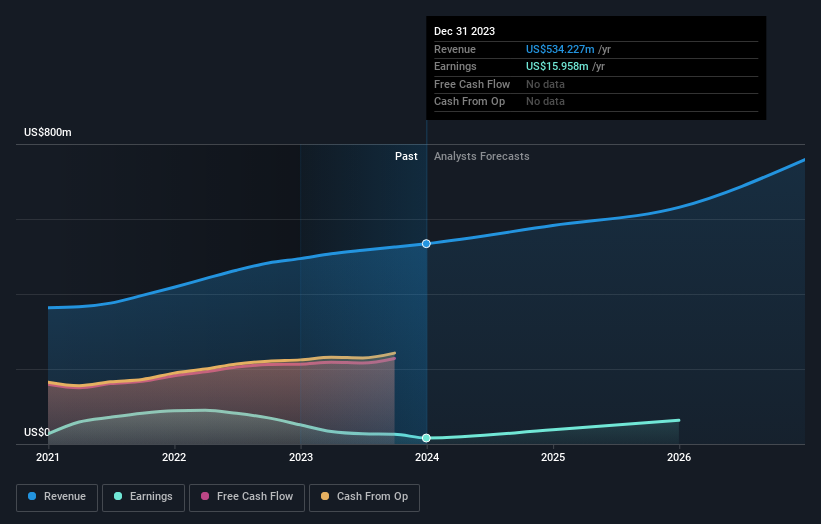Regional Management Corp. Just Missed EPS By 42%: Here's What Analysts Think Will Happen Next
The analysts might have been a bit too bullish on Regional Management Corp. (NYSE:RM), given that the company fell short of expectations when it released its full-year results last week. Results showed a clear earnings miss, with US$534m revenue coming in 3.2% lower than what the analystsexpected. Statutory earnings per share (EPS) of US$1.66 missed the mark badly, arriving some 42% below what was expected. This is an important time for investors, as they can track a company's performance in its report, look at what experts are forecasting for next year, and see if there has been any change to expectations for the business. With this in mind, we've gathered the latest statutory forecasts to see what the analysts are expecting for next year.
Check out our latest analysis for Regional Management
Taking into account the latest results, the consensus forecast from Regional Management's four analysts is for revenues of US$582.7m in 2024. This reflects a decent 9.1% improvement in revenue compared to the last 12 months. Per-share earnings are expected to shoot up 159% to US$4.24. Before this earnings report, the analysts had been forecasting revenues of US$586.7m and earnings per share (EPS) of US$4.69 in 2024. So it looks like there's been a small decline in overall sentiment after the recent results - there's been no major change to revenue estimates, but the analysts did make a small dip in their earnings per share forecasts.
It might be a surprise to learn that the consensus price target fell 12% to US$28.50, with the analysts clearly linking lower forecast earnings to the performance of the stock price. It could also be instructive to look at the range of analyst estimates, to evaluate how different the outlier opinions are from the mean. There are some variant perceptions on Regional Management, with the most bullish analyst valuing it at US$33.00 and the most bearish at US$25.00 per share. Still, with such a tight range of estimates, it suggeststhe analysts have a pretty good idea of what they think the company is worth.
Looking at the bigger picture now, one of the ways we can make sense of these forecasts is to see how they measure up against both past performance and industry growth estimates. It's pretty clear that there is an expectation that Regional Management's revenue growth will slow down substantially, with revenues to the end of 2024 expected to display 9.1% growth on an annualised basis. This is compared to a historical growth rate of 12% over the past five years. By way of comparison, the other companies in this industry with analyst coverage are forecast to grow their revenue at 12% per year. Factoring in the forecast slowdown in growth, it seems obvious that Regional Management is also expected to grow slower than other industry participants.
The Bottom Line
The biggest concern is that the analysts reduced their earnings per share estimates, suggesting business headwinds could lay ahead for Regional Management. Fortunately, the analysts also reconfirmed their revenue estimates, suggesting that it's tracking in line with expectations. Although our data does suggest that Regional Management's revenue is expected to perform worse than the wider industry. Furthermore, the analysts also cut their price targets, suggesting that the latest news has led to greater pessimism about the intrinsic value of the business.
With that said, the long-term trajectory of the company's earnings is a lot more important than next year. We have forecasts for Regional Management going out to 2026, and you can see them free on our platform here.
However, before you get too enthused, we've discovered 4 warning signs for Regional Management (1 is a bit unpleasant!) that you should be aware of.
Have feedback on this article? Concerned about the content? Get in touch with us directly. Alternatively, email editorial-team (at) simplywallst.com.
This article by Simply Wall St is general in nature. We provide commentary based on historical data and analyst forecasts only using an unbiased methodology and our articles are not intended to be financial advice. It does not constitute a recommendation to buy or sell any stock, and does not take account of your objectives, or your financial situation. We aim to bring you long-term focused analysis driven by fundamental data. Note that our analysis may not factor in the latest price-sensitive company announcements or qualitative material. Simply Wall St has no position in any stocks mentioned.

